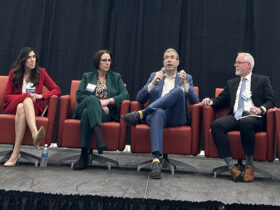 The pandemic has changed the way we live, shop and work.
The pandemic has changed the way we live, shop and work.
The aftermath will be a continuation of our lives virtually in one form or another. COVID-19 has transitioned us to the value of mobile marketing individually, as a tribe, and as a company. It has introduced many to a different way of living, shopping and working online.
It has devastated many companies and people – but has also created opportunities for new businesses and individuals. Unfortunately, the economy will take some time to recover and many will continue to struggle.
What will the new world of work look like?
One thing is certain: the office will be altered dramatically. Working remotely has proven to be a viable and cost-effective alternative for many companies. This reduces the need and expense for companies of having large office spaces in urban areas, as well as the cost and time commuting for employees. There will continue to be company offices, but likely smaller due to fewer employees needed to actually work at the company office.
Retail outlets and especially big box stores will also be fewer and smaller, as online shopping has proven to be another more cost-effective alternative to physically shopping as we knew it. Likewise, malls will still be in existence but the presentation of the stores and other outlets in the malls will be configured quite differently than in the past.
New avenues of operations, marketing and sales
Marketing and selling will become more and more dominated by social media marketing and social selling will replace many of the physical salespeople of old. Mobile marketing will become the way more and more goods and services are transacted on-the-go via smart phones and other electronic devices.
For example, healthcare will continue to adopt a more online presence with advances in telemedicine and closer partnerships with pharmacies, local emergency retail-like medical outlets offering diagnostics for non critical situations and scanning and imaging offices in many communities. The local pharmacy could become a quasi-healthcare provider with more nurse assistant type medical professionals supplementing pharmacists.
Companies will restructure and more people will work for themselves
Lastly, more and more displaced individuals will become sole proprietors, consultants or contractors for the companies that they used to work for thus further, reducing the fixed costs of “employees” for many companies.
For example, academia has likewise suffered and will continue to as more and more education has become available for less online. Fewer and fewer students will actually be on campus and attend in person classes. Tenured faculty and adjuncts will become redundant as the courses they have taught historically will be eliminated due to a lack of interest and registration. Campuses will also shrink in size as the costs to maintain them will become prohibitive. Many universities will have to sell some of their huge properties to real estate developers to raise cash to continue operating.
These are some of the major ways how we live, shop and work are changing.














